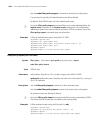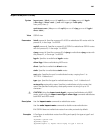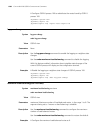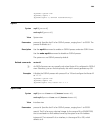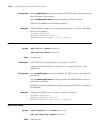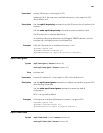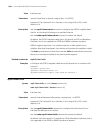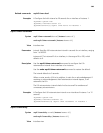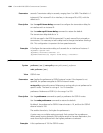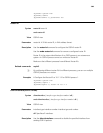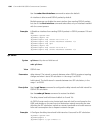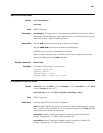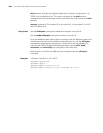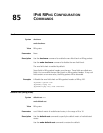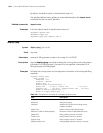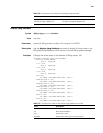
1304 CHAPTER 84: IPV6 OSPFV3 CONFIGURATION COMMANDS
Parameters seconds: Transmission delay in seconds, ranging from 1 to 3600. The default is 1.
instance-id: The instance ID of an interface, in the range of 0 to 255, with the
default as 0.
Description Use the
ospfv3 trans-delay command to configure the transmission delay for
an interface with an instance ID.
Use the
undo ospfv3 trans-delay command to restore the default.
The transmission delay defaults to 1s.
As LSAs are aged in the LSDB (incremented 1 by each second) but not aged on
transmission, it is necessary to add a delay time to the age time before sending a
LSA. This configuration is important for low-speed networks.
Examples # Configure the transmission delay as 3 seconds for an interface of instance 1.
<Sysname> system-view
[Sysname] interface ethernet 1/0
[Sysname-Ethernet1/0] ospfv3 trans-delay 3 instance 1
preference
Syntax preference [ ase ] [ route-policy route-policy-name ] preference
undo preference [ ase ]
View OSPFv3 view
Parameters ase: Applies the preference to OSPFv3 external routes. If the keyword is not
specified, the preference applies to OSPFv3 internal routes.
route-policy route-policy-name: References a routing policy to set preference for
specific routes. The name is a string of 1 to 19 characters.
preference: Preference of OSPFv3, in the range 1 to 255.
Description Use the
preference command to specify a preference for OSPFv3 routes.
Use the undo preference command to restore the default.
By default, the preference for OSPFv3 internal routes is 10, and that for OSPFv3
external routes is 150.
The smaller the value is, the higher the preference is.
A router may run multiple routing protocols. Each protocol has a preference.
When several routing protocols find multiple routes to the same destination, the
route found by the protocol with the highest preference is selected.
Examples # Set a preference of 150 for OSPFv3 routes.



